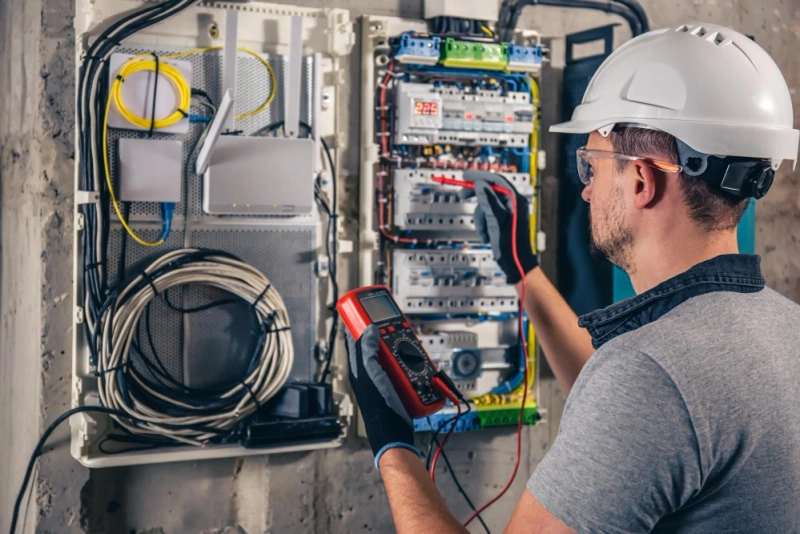Electrical repairs are a common necessity for homeowners, ranging from simple fixes to more complex issues. When faced with electrical problems, the decision between attempting a do-it-yourself (DIY) repair and hiring a professional can be challenging. Both options have their advantages and drawbacks, and understanding the pros and cons is crucial for making an informed choice.
In this article, we will explore the key aspects of DIY electrical repairs versus hiring a professional.
DIY Electrical Repairs:
Pros:
1. Cost Savings
One of the primary reasons homeowners opt for DIY electrical repairs is the potential cost savings. Doing the work yourself eliminates labor expenses associated with hiring a professional electrician. Moreover, you can save money on service call fees, which can be significant depending on the complexity of the issue.
2. Flexibility and Convenience
DIY repairs allow you to address electrical issues at your convenience. You won't have to wait for an electrician's availability, which can be especially beneficial for minor problems that don't require immediate attention.
3. Skill Development
Taking on electrical repairs as a DIY project can be a valuable learning experience. It provides an opportunity to acquire new skills and gain a better understanding of your home's electrical system. Simple tasks like replacing a light switch or installing an outlet cover can boost your confidence in handling basic electrical work.
4. Immediate Action
In emergencies or situations that require immediate attention, DIY repairs empower you to take quick action without waiting for a professional. This can be crucial in preventing further damage or ensuring the safety of your household.
Cons:
1. Safety Concerns
Electrical work involves inherent risks, and even seemingly simple tasks can be dangerous if not done correctly. Lack of experience and knowledge can lead to electric shocks, fires, or other hazards. Professionals are trained to adhere to safety standards and regulations, minimizing the risks associated with electrical repairs.
2. Code Compliance
Electrical repairs must comply with local building codes and regulations. DIYers may lack knowledge of these codes, resulting in installations that are not up to standard. Non-compliance can lead to safety issues, failed inspections, and even legal consequences.
3. Complexity of Issues
While DIY projects are suitable for minor repairs, complex electrical issues often require the expertise of a professional. Attempting to fix intricate problems without the necessary knowledge can lead to additional complications and more extensive damage.
4. Limited Warranty
DIY repairs typically do not come with a warranty. If the issue persists or worsens after your attempt, you may end up spending more money when hiring a professional to fix the problem correctly.
Hiring a Professional:
Pros:
1. Expertise and Experience
Professional electricians undergo extensive training and have hands-on experience in handling a wide range of electrical issues. Their expertise ensures that the problem is correctly diagnosed and fixed, reducing the likelihood of recurring issues.
2. Safety Assurance
Safety is a top priority for professional electricians. They follow safety protocols and have the necessary equipment to protect themselves and your property. Hiring a professional minimizes the risks associated with electrical work, ensuring the safety of your home and family.
3. Code Compliance
Professionals are well-versed in local building codes and regulations. Hiring an electrician ensures that the repairs are done in compliance with these standards, preventing potential legal issues and ensuring the longevity of the fix.
4. Time Efficiency
Professional electricians are efficient in identifying and solving electrical problems. Hiring a professional can save you time, especially for complex issues that may take an inexperienced DIYer much longer to resolve.
Cons:
1. Cost
The most significant drawback of hiring a professional is the cost involved. Professional electricians charge for their expertise and labor, making the overall expense higher than a DIY approach. However, the investment often ensures a quality and long-lasting repair.
2. Scheduling Constraints
Depending on the urgency and the electrician's availability, there might be a waiting period for professional services. This could be a drawback when immediate action is required.
3. Dependency on Others
Opting for professional services means relying on someone else to address your electrical issues. If you prefer having control over your home repairs or need immediate attention, this dependence might be a drawback.
Conclusion
In the debate between DIY and hiring a professional for electrical repairs, both options have their merits and drawbacks. The decision ultimately depends on the nature of the electrical problem, your skill level, and the importance of safety and compliance. For simple tasks and confident DIYers, tackling minor electrical repairs can be a cost-effective and rewarding experience. However, for complex issues, safety concerns, or a lack of expertise, hiring a professional ensures a reliable and compliant solution. Before making a decision, carefully weigh the pros and cons, and if in doubt, consult with a professional to determine the best course of action for your specific situation. Remember, the safety of your home and family should always be a top priority when dealing with electrical repairs.


